- Home
- Rudy Rucker
The Secret of Life Page 2
The Secret of Life Read online
Page 2
“I’m sorry about last night,” mumbled Conrad. He’d managed to avoid his father so far today.
“You’re making a name for yourself, boy. People remember these things. What am I going to tell Holman Barkley when I see him downtown?I’m sorry my son threw up on your daughter? ”
“I didn’t ...” Conrad broke off in horror as the memory swept back. Hehad thrown up on Linda. On her legs. She’d phoned up her father for help. Ardmore and two other guys had driven Conrad home and ...
“Have you apologized to your mother?”
“Uh, sure, yeah.”
“Conrad, what’s the matter with you? Up until just a few months ago we were so proud of you. And now your grades are slipping; every time you get a chance you go out and get your snoot full; you say you’re sick of church ... what’s the problem, Conrad? What is it?” His father seemed genuinely baffled.
“Well, Pop, I’m worried about death. If humans have to die anyway, then everything’s meaningless, isn’t it?”
“So that’s it now,” sighed Mr. Bunger. “I’ll tell you one thing, boy, if you’re worried about death, you shouldn’t be drinking and driving. Otherwise your life will be over before you know what hit you.”
“Some other guys drove me back last night. And it doesn’t really matter how long I live anyway. Sooner or later it comes to the same thing: nothing.”
“What if I’d felt that way?” said Mr. Bunger, his voice rising. “Look at this house, look at you and your brother. If I’d chickened out young, you wouldn’t be here!”
“So I’m supposed to get a job and buy a house and have kids and be just like you? I don’t see the point of it, Pop. What’s the difference, really, if there’s one more or one less nice middle-class family?”
Conrad meant all this, though at the same time he was conscious of adopting a pose. The main thing was to get the better of his father—his father who was always so right and so patient. “I hope the Russians bomb us tomorrow and blow all this bullshit away.”
That did it. “I ought to paste you one!” shouted Mr. Bunger. “Go inside and do that homework you’ve been putting off all vacation.Take , that’s all you know,take, take, take , and if it’s not enough, tear everything down. I’ll give you the meaning of life—you’re not using Mom’s car again till you pull your grades back up. School starts again tomorrow, thank God.”
“You’re just scared to face death,” sneered Conrad. “That’s the only reason you can believe all that religion crap.”
He took off running before his father could react. He made it to his room and slammed the door.The old people are scared , thought Conrad fiercely,but I’m not. I’m not scared to look for the real answers.
That’s what I’m here for—to figure out the secret of life.
Chapter 3:
Monday, January 7, 1963 Although the Bungers were Episcopalian, Conrad attended a big Roman Catholic boys high school called St. X. The idea was that St. X had the best science program in Louisville; and Conrad was supposed to become a scientist. He was one of three non-Catholics among the two thousand students at St. X. During Conrad’s four years there, the other boys often tried to “baptize” him. This involved dragging him into a bathroom and slugging him and throwing water or piss on him. By the time Conrad was a senior, he’d formed a real dislike for the Roman Catholic religion. It was even stupider than Protestantism. Purgatory? Limbo? Papal Infallibility? The Virgin Mary’s Immaculate Conception and Bodily Assumption? These were all bad enough, but for some reason, the doctrine that bothered Conrad the most was Transubstantiation.
According to the hearty priest who taught the religion class, when the bread and wine are blessed at Mass, they turn into literal, actual flesh and blood. Some of the other boys told Conrad it had to be true, since they’d heard of a kid who’d stolen a consecrated Communion wafer and stuck pins in it ... and the wafer hadbled .
“Can you taste the blood when you chew it?” Conrad demanded.
“You’re not allowed to chew.”
Even more bizarre than the religion classes were the monthly sex lectures that the seniors got. Normally the boys were split into ten different tracks, but for the sex lectures, all four hundred seniors would be herded into the gym together. They’d sit up in the bleachers, and a priest named Father Stook would hold forth like some crazed dictator. Father Stook’s chief interests were rubbers and jacking off.
“I’ve had mothers come to me, boys, come to me in tears because they found one of those things in their son’s wallet. Don’t break your mother’s heart! The use of contraceptives is but one step better than the mortal sin of self-abuse.Self-abuse destroys the mind! I knew one poor man, boys, a deranged syphilitic. I was at his bedside when he passed away. And do you know what that pitiful wretch was doing as he died? Do youknow ?He was reaching down to abuse himself! What a way to meet your Maker, boys.In the very act of committing the vilest perversion! Now, I know that some of you may have heard that certain acts between men and women are perversions. Not so. As long asthe penis ejaculates inside the vagina , no sin against God has been committed. What you and your wife do before ejaculation is strictly your own affair, as long asthe seed is planted in the womb . Oh, I’ve heard it’s a marvelous thing. I’ve read that when the woman reaches a certain state of arousal, there are contractions within the walls of her vagina . A kind of suction is created. One member of my parish told me, ‘Father Stook, if the good Lord made anything better, He kept it for Himself.’ There is no inherent evil in sex, boys; sex is God’s gift to man.Perversion arises only when the seed isturned aside .
Now, I tell my mothers to be on the lookout for contraceptives in their sons’ rooms. And I’ve heard that some of you fellows are too smart for that. Oh, I know all the tricks. Yes, there was one boy who kept his prophylacticstaped to the inside of his car’s rear hubcap . I said Mass at his funeral last February.
For one snowy night, he was out there in the street, with a tire iron in his hand, and his pants around his ankles, and ...”
On the first Monday after Christmas vacation, Conrad had to hand in a theme for English class. The assignment had been to write a fantastic story of some type. Conrad had chosen to write a science-fiction story satirizing the Roman Catholic Church. The idea in the story was that an alien energy-creature comes to Earth and takes on human form, so as better to understand mankind’s peculiar ways of thought. He has superpowers, of course, and starts out by practicing his power of flight in a deserted pasture. As chance would have it, a group of nuns shows up for a cookout, just as the alien is hovering ten feet above the ground. Most of the nuns think the alien must be a new Messiah, the Second Coming of Christ. But one of the nuns claims the alien is the Antichrist, and before anyone can stop her, she chokes him to death with her rosary. The other nuns decide to cover up their sister’s crime by barbecuing the body. It tastes wonderful! “Truly,” says one chomping nun, “this is the flesh of God.”
“Yes, Conrad, I will write you a Jug ticket.” A Jug ticket was a small yellow square of paper. It meant that you had to stay after school for an hour.
After class Brother Marion drew Conrad aside. “I’m disappointed by your story, Conrad. Surely you can find more deserving targets than the Church.”
“But ... how can you believe all those crazy things? How can you believe in Transubstantiation? A wafer is a wafer, not the flesh of Christ!”
“God became flesh, why should flesh not become bread? Although theaccidental properties of the consecrated wafer are as bread, itsessence is Christ’s flesh. Theaccidental properties of Christ’s body were human, yet His body’sessence was divine.” Brother Marion’s hollow eyes glinted briefly. “You should read Aquinas, not blaspheme like a fool.”
The brother in charge of Jug was a lean zealot with angry red acne scars on his face. Brother Saint-John-of-the-Cross. Nobody messed with Saint-John-of-the-Cross. You sat there and wrote for an hour, and then Brother Saint-John-of-the-Cross threw your essay away an
d you could go home. The topic of the essay was always the same:Why I Am in Jug.
Taking his pen in hand, Conrad felt a strange surge of power.Nobody would read this. He could write whatever he wanted to. It was something Conrad had never thought of doing before—sit at a desk and write whatever you’re thinking.
“Stop grinning, Bunger, and get to work. Two sides.Why I Am in Jug .”
Conrad began with the stupid way that Jeans always stuck his lower jaw out to look like he was thinking, and then moved right into some confused vaporing about how misunderstood he, Conrad Bunger, really was.Half a page. Conrad recounted one of Father Stook’s recent tales, the one about the man who’d injured the side of his penis with his electric drill, and who’d then come to Father Stook for permission to wear a condom during intercourse so that the raw spot wouldn’t chafe. “All right,” Father Stook had said, “but you have to puncture the tip.”A page and a quarter. Conrad explained about death, and how the secret of life is that we each possess a fragment of the universal life-force.A page and two-thirds. He ended by making fun of a St. X administrator called Deforio. Deforio was in charge of issuing late-slips.
“Sports fan Deforio’s moronic robot scrawl.” Here and there a few gaps remained. Conrad filled them in with random curse words. He felt like if he willed it, he could float right up to the ceiling.
“I’m all done, Brother Saint-John-of-the-Cross. Can I go home now?”
The next morning, as he was walking down the hall to his third period mathematics class, Conrad was suddenly struck from behind. Something clamped on to the soft tendons of his neck and dragged him into an empty classroom. It was Brother Saint-John-of-the-Cross.
Conrad had once seen Brother Saint-John-of-the-Cross punch a student, a football player, in the jaw.
Quivering with fear, he crept off to math class. But as soon as he sat down, the wall speaker crackled into life.
“Brother Albert? Could you please send Conrad Bunger to the Assistant Principal’s office?”
The other boys looked at Conrad as he left the silent room. Some smiled, some gloated, some simply looked upset.Next time it could be me. Berkowitz, the class clown, squeaked, “Help!” from the back row.
The Assistant Principal was a wise-eyed man with big shoulders and a trim gray crew cut. His name was Brother Hershey. If Saint-John-of-the-Cross was a hard cop, Hershey was a soft cop. He had a Boston accent and an air of pained rationality.
“Come in, Conrad. Sit down.” Hershey slumped back in his chair and sighed. Conrad’s Jug essay was lying on his desk. “Some of the brothers are very unhappy with you.”
“Saint-John-of-the-Cross.”
“And Brother Marion.And Brother Albert. A change has come over you, Conrad. Are you having personal problems?”
“Well ... it’s about death. Life is meaningless. I can’t see any reason for any of it.” Hershey started to interrupt, but Conrad pressed on. “I’ve been reading books about it.Nausea , andOn the Road . I’m not just making it up. Any action is equally meaningless. The present moment is all that matters.”
“I’ve heard of those books,” Hershey said shortly. “Do you think it’s your place to ride the brothers about religion?”
“No, sir.”
“You say that the moment is all that matters, Conrad. Has this attitude led you into ... sins of impurity?”
“Uh, no, sir. No.”
“You’re not a mule, Conrad. I can reason with you, can I not?”
“Yes.” Conrad knew what Brother Hershey was hinting at. If you really acted up, Hershey would take you out to the gym and paddle you. A lower-track boy had told Conrad about it at lunch one day.“He carries that paddle hid under his robe. All the way out to the gym you can hear it bangin’ on his goddamn leg.”
“Because I would rather not have to treat a good student like a mule.”
“You can reason with me, Brother Hershey. I understand. I’ll act better. I can hold out till graduation.”
“Fine.” Hershey picked up the Jug essay, scanned one side, and then the other. “You misspelled Mr. Delfioro’s name.”
Pause.
“Sure.” How long was this going to go on?
“I had doubts, too, when I was your age. We all have doubts; God never meant for life to be easy.”
“How do you know there’s a God?” blurted Conrad. The pressure of all the things he wanted to say was like a balloon in his chest. “I mean, sure, the life-force exists, but why should there be a God who’s watching us? It’s wrong to try and explain everything with an invisible God and a life after death. Life should make sense right here and now!”
Brother Hershey leaned forward and studied the calendar on his desk. When he spoke again there was an edge to his voice. “There are six months and ten days until graduation, Conrad. Discipline yourself.
Pretend to believe, and belief may come to you. I don’t want to see you in here another time.”
“OK.” Conrad thought again of the paddle.
“When you go back to class, your buddies are going to ask you what happened.”
“Yes, sir.”
“Tell them it’s none of their business.”
“Yes, sir. Thank you, Brother Hershey.”
By the time school let out it was raining hard. Conrad got his books and ran out to wait for his bus. A
little ninth-grader was talking about how it would snow most likely and all the teachers would be in a bus and have an accident and then there wouldn’t be school for a few weeks while they got all the teachers buried. There were about fifteen boys waiting for the bus and saying when’s that son of a bitch gonna get here anyway, hell, we probably won’t get out of this place till six. But then the bus pulled up anyway and they all ran through the rain and Conrad stepped in a puddle on purpose, and all the other bus guys were hurrying to get good seats. Conrad sat in back by himself, he felt so cut off and who gave a damn listening to the bus guys all excited about parties or cigarettes or getting drunk. He felt like a cold hand was grabbing his guts and squeezing them. The bus started moving and all the bus guys were shouting, not out of joy, but to get everyone to look at them, but nobody really noticed each other, except some of the guys who were really bugged about not making the scene were laughing at all the right times. Then the bus was really going, and Conrad was sitting at the window looking at the road all black shiny wet and being amazed at how humans move by going past stationary objects and not hitting anything. He was hungry as hell because of no lunch. He felt like vomiting, but instead he spat on a bunch of little white worms which lived in a crack in the floor. Looking out the window again, he saw a great big oak tree dripping unbelievable drops into a puddle and blurping up giant bubbles that looked like jellyfish until they popped, but the whole time all the guys in the bus were shouting. The guy in front of Conrad had picked a scab off his face and was dabbing at the blood with a piece of paper, and the guy he was talking to didn’t even notice it, and Conrad was the only one who saw it except for a little kid across the aisle, and when Conrad stared at his eyes he wouldn’t look back, and acted like he saw something outside the window, and when Conrad looked out he saw that the gutters were overflowing and there were big brown triangle puddles on the road.
Chapter 4:
Friday, March 15, 1963 “Let’s stop here for supper, gang.”
“Yay, Jeannie!”
Conrad felt dazed and confused. This was the first time he’d been allowed to go out in three weeks. An outing of the church youth group, on their way to an all-state Episcopal youth jamboree. The girls had been singing for eighty miles, singing with hysterical good cheer. The only other guy was named Chuck Sands. He read the Bible, had pimples and greasy hair. Strong, jolly Jeannie—a woman who often helped with youth group activities—was driving this van, and Conrad’s father was driving another. What a nightmare.
They piled out of the van in front of a family restaurant in some tiny Kentucky town. The girls rushed ahead and got a table by the windo
w. There were four of them. Butt-faced Patsie Wilson; a distant, chain-smoking girl called Dee Decca; and two “hot” gigglers named Sue Pohlboggen and Randy Kitsler.
“Come on, Bunger,” urged Chuck Sands. They were still out by the van. Inside the bright window’s yellow space, Sue Pohlboggen was fluffing her blonde curls, and Dee Decca was lighting a Newport.
Patsie was whispering secrets to Randy. Jeannie was in the ladies’ room.
“I need air, Sands. I’ll just get something at a supermarket and eat outside, OK?”
“Fine,” said Sands. “That gives me more room to maneuver.”
Conrad hurried around the corner and walked a few blocks. Seed store, drugstore, dentist, bank. It felt good to be alone, in the middle of nowhere, free from the relentless pressure to conform. He flared his nostrils and breathed in alienation. This was a time to be thinking deep thoughts.
What is it all about?he asked himself.Why is all of this here? How can human beings be so blind?
The girls primping their hair and waiting for food. Didn’t they see the nothingness which underlies everything?
For the last few months, Conrad had had a strange feeling of having just woken up. His early childhood ... he could barely remember anything about it. Later, as an adolescent, he’d simply taken things as they’d come, the good with the bad, no questions asked. But now ... he was cut off, awkward and posturing, aself in a world of strangers. And what lay ahead? A meaningless struggle ending with a meaningless death. How could anyone take rules seriously? His parents, the brothers at school, the cool party-boys and the horny youth-group kids ... how could they act like they knew the answers?
Conrad tripped on a crack in the sidewalk just then. Something strange happened as he fell. Some special part of his brain cut in, and instead of falling, he ... hung there, tilted forward, in defiance of natural law.

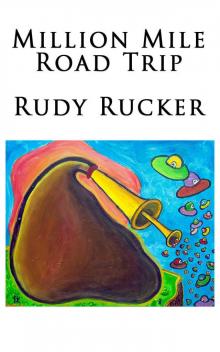 Million Mile Road Trip
Million Mile Road Trip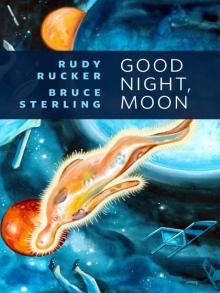 Good Night, Moon
Good Night, Moon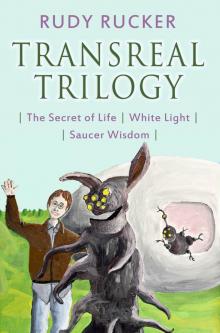 Transreal Trilogy: Secret of Life, White Light, Saucer Wisdom
Transreal Trilogy: Secret of Life, White Light, Saucer Wisdom Complete Stories
Complete Stories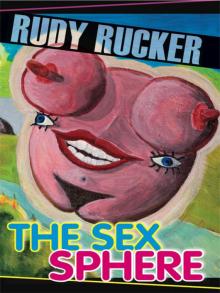 The Sex Sphere
The Sex Sphere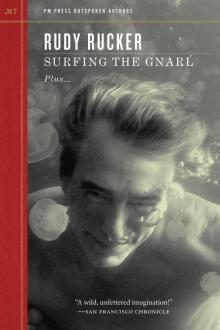 Surfing the Gnarl
Surfing the Gnarl Software
Software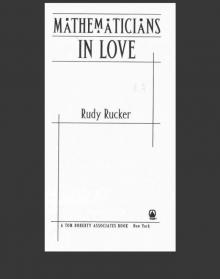 Mathematicians in Love
Mathematicians in Love Seek!: Selected Nonfiction
Seek!: Selected Nonfiction The Secret of Life
The Secret of Life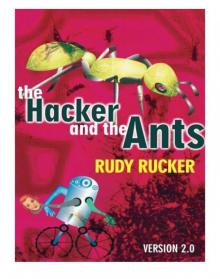 The Hacker and the Ants
The Hacker and the Ants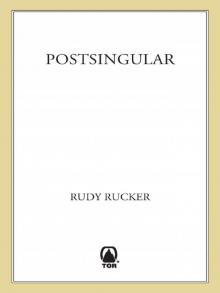 Postsingular
Postsingular Spaceland
Spaceland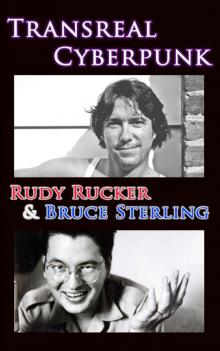 Transreal Cyberpunk
Transreal Cyberpunk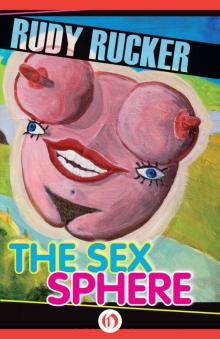 Sex Sphere
Sex Sphere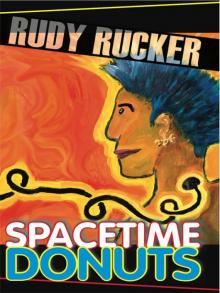 Spacetime Donuts
Spacetime Donuts Freeware
Freeware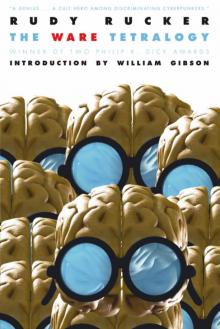 The Ware Tetralogy
The Ware Tetralogy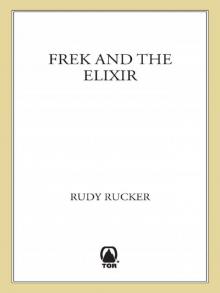 Frek and the Elixir
Frek and the Elixir Junk DNA
Junk DNA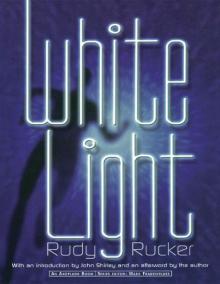 White Light (Axoplasm Books)
White Light (Axoplasm Books)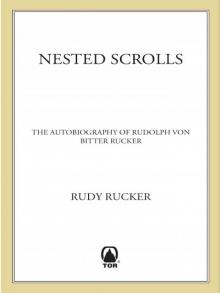 Nested Scrolls
Nested Scrolls Inside Out
Inside Out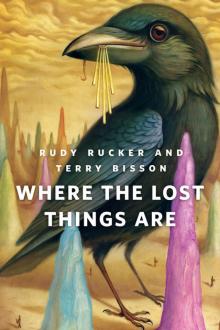 Where the Lost Things Are
Where the Lost Things Are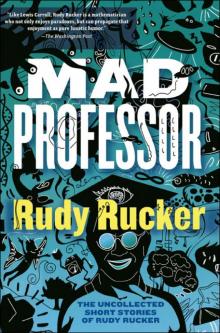 Mad Professor
Mad Professor As Above, So Below
As Above, So Below Realware
Realware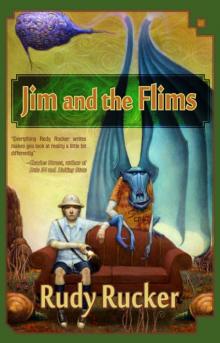 Jim and the Flims
Jim and the Flims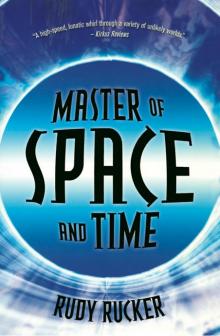 Master of Space and Time
Master of Space and Time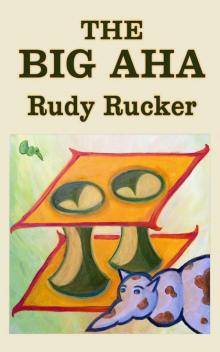 The Big Aha
The Big Aha Hylozoic
Hylozoic